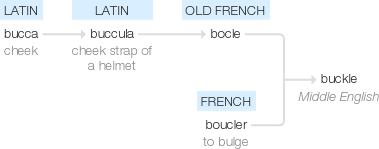Buckle
Middle English: from Old French bocle, from Latin buccula ‘cheek strap of a helmet’, from bucca ‘cheek’. buckle (sense 2 of the verb) is from French boucler ‘to bulge’.
wiktionary
From a frequentative form of buck(“to bend, buckle”), of Dutch Low Saxon or German Low German origin, related to Dutch bukken(“to stoop, bend, yield, submit”), German bücken(“to stoop, bend”), Swedish bocka(“to buck, bow”), equivalent to buck + -le. Compare Middle Dutch buchelen(“to strive, tug under a load”), dialectal German aufbückeln(“to raise or arch the back”).
From Middle English bokel(“spiked metal ring for holding a belt, etc”), from Old French boucle, bocle(“"boss (of a shield)" then "shield," later "buckle, metal ring”), from Latin buccula(“cheek strap of a helmet”), diminutive of bucca(“cheek”).
etymonline
buckle (n.)
"spiked metal ring for holding a belt, etc.," c. 1300, bukel, from Old French bocle "boss (of a shield)," then "shield," then by further extension "buckle, metal ring," (12c., Modern French boucle), from Latin buccula "cheek strap of a helmet," in Late Latin "boss of a shield," diminutive of bucca "cheek" (see bouche).
Boucle in the middle ages had the double sense of a "shield's boss" and "a ring"; the last sense has alone survived, and it metaph. developed in the boucle de cheveux, ringlets. [Kitchin]
buckle (v.1)
"to fasten with a buckle," late 14c., bokelen, from buckle (n.). Meaning "prepare for action of any kind" (1560s) probably is a metaphor from buckling on armor before battle. Related: Buckled; buckling.
buckle (v.2)
"distort, warp, bend out of shape" 1520s, bokelen "to arch the body," from French boucler "to bulge," from Old French bocler "to bulge," from bocle "boss of a shield" (see buckle (n.)). Meaning "to bend under strong pressure" is from 1590s (figurative from 1640s) . Related: Buckled; buckling.
